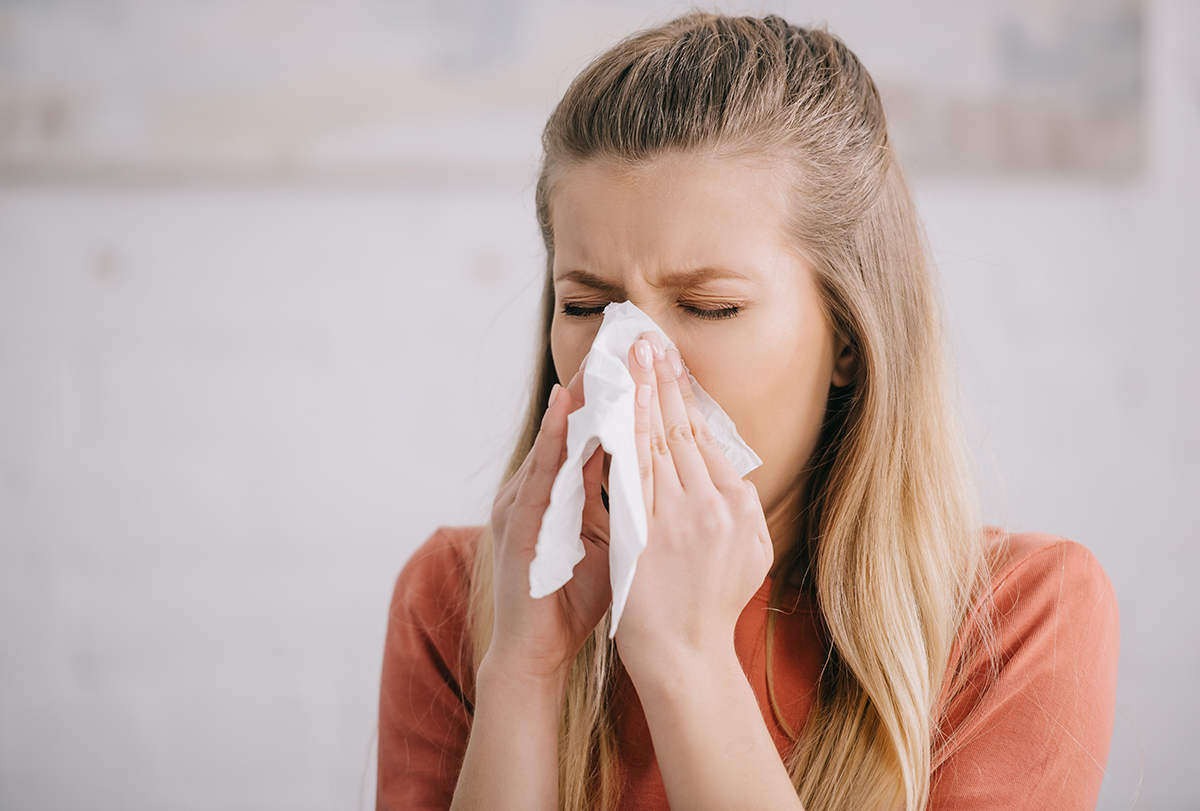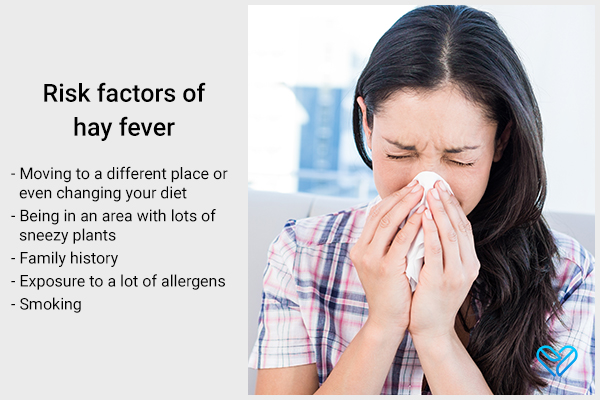In this article:
You don’t actually have to be near hay or have a fever to hay fever, also called allergic rhinitis. Hay fever is an allergic reaction to various things in the environment such as pollen, mold, dust, and even pet hair.

There are two types of hay fever: seasonal and perennial. Seasonal hay fever happens during specific times of the year when certain plants are releasing pollen. Perennial hay fever can happen all year round and is usually caused by indoor allergens such as dust mites and pet dander.
Hay fever doesn’t actually cause a fever. Instead, it causes annoying symptoms including sneezing, runny nose, itchy eyes, and congestion.
Note: Some things can trigger hay fever symptoms even if you don’t have an allergy, such as strong perfume or cleaning products. So, it’s not always about allergies. (1)
Don’t worry – you don’t have to suffer through hay fever forever. There are ways to manage it and get back to enjoying life again. And it all starts with finding an allergist who can help you figure out what’s causing your hay fever and come up with a treatment plan
Read on to learn about hay fever in a bit more detail.
Causes of Hay Fever
Your immune system is like a superhero squad, protecting you from the bad stuff. But sometimes, it gets a bit excited and thinks harmless substances, such as pollen, are dangerous.
When you come in contact with pollen, your immune system goes into action mode. It makes these special proteins called antibodies that bind to specific cells.
When these cells encounter pollen again, they release chemical substances such as histamine. And that’s when the trouble starts.
Histamine is like the troublemaker in your body. It causes all the annoying allergy symptoms including sneezing, itchy eyes, and a runny nose. (2)
The plants that produce pollen that usually causes hay fever and their peak months are:
- Hazel tree – February
- Alder tree – March
- Birch tree – April
- Beech tree – May
- Oak tree – May
- Ash tree – Mid-April to Mid-May
Some grasses and weeds are also culprits for hay fever: (2)
- Grasses – Mid-May to Mid-August
- Mugwort – Mid-July to late August
- Ragweed – September
Sometimes, allergies run in families. So if your parents or siblings have hay fever, you might be more likely to join the sneeze fest. Moreover, air pollution and cigarette smoke can make you more prone to allergies. (2)
Symptoms of Hay Fever
Symptoms of hay fever include: (1)
- Stuffy or runny nose
- Itching in the nose, mouth, eyes, or throat
- Red and watery eyes
- Sneezing
- Coughing
- Puffy eyelids
Hay fever can also cause diminished attention span and focus, restricted activities, reduced hand-eye coordination, testiness, sleep disturbances, tiredness, absenteeism at work or school, and increased road accidents and injuries. (1)
Children with hay fever may be more moody and irritable during allergy season with nasal obstruction, and their symptoms should not be mistaken for attention deficit disorder.
Note: Symptoms of allergic rhinitis can be mistaken for infectious rhinitis caused by the common cold or other nonallergic causes.
Risk Factors of Hay Fever

Several factors can increase your chances of getting hay fever: (3)
- Lifestyle changes, such as moving to a new place or changing your diet
- Living in an area with lots of plants that produce pollen that triggers hay fever
- Family history – If your parents or siblings have hay fever, you are more likely to get it too.
- Exposed to a lot of allergens, especially at a young age
- Smoking
Treatment for Hay Fever
Several medications are typically considered for hay fever:
1. First-line treatment intervention
First-line drug treatments include oral antihistamines (such as cetirizine and diphenhydramine) with decongestants or nasal corticosteroids (such as budesonide).
2. Nasal mast cell stabilizers and intranasal saline
Other options can be considered such as nasal mast cell stabilizers and intranasal saline. Treatment options may also involve a combination of these approaches. (4)
Note: It is important to remember that although nasal sprays containing steroids reduce swelling in the nasal membranes, providing relief from symptoms such as a runny or stuffy nose, they are not suitable for long-term use and may cause side effects such as nosebleeds. (4)
3. Immunotherapy and desensitization
Another treatment approach is immunotherapy and desensitization.
It is a treatment method that involves administering small amounts of allergens to a person over a period of time. The purpose is to gradually desensitize the immune system to specific allergens, reducing or eliminating the allergic response. It can be an effective long-term solution for managing allergies. (5)
Immunotherapy may be recommended for seasonal rhinitis (seasonal allergies) and may be necessary for severe and persistent rhinitis that does not respond to other treatments.
Note: It’s important to start desensitization soon after the pollen season ends to prepare for the next season, as beginning during the pollen season can lead to increased adverse reactions.
Testing for and Diagnosing Hay Fever

The first step is to visit an allergist, who will ask questions about your lifestyle, such as where you work, where you live (pets included), and how often and how bad your symptoms are.
This is followed by the skin test. Your allergist will introduce tiny amounts of potential allergens into your skin to check if they trigger a reaction.
There are two main types of skin tests. The first one is called the prick or scratch test, which involves scratching or pricking your skin with a drop of a suspected allergen. (5) After 10–20 minutes, the site is observed for a reaction.
The second type is the intradermal test, which involves injecting a small amount of a possible allergen under your skin with a super thin needle. After about 20 minutes, the site is evaluated for any reaction. This test is usually more sensitive than the prick or scratch test. (1)(6)
When to See a Doctor
Most of the time, you can manage hay fever symptoms on your own or with over-the-counter medications. But there are certain situations when it’s a good idea to see a doctor who specializes in allergies.
Here are some indicators that you might need to make that appointment: (7)
- If the usual hay fever treatments aren’t bringing you relief
- If your symptoms are unusual or don’t fit the typical hay fever pattern
- If you’re not sure whether it’s hay fever or something else is causing your symptoms
- If you’re experiencing frequent or persistent sinus or middle ear infections alongside your hay fever
Final Word
Hay fever can be a frustrating and disruptive condition, but a variety of treatments are available to help alleviate the symptoms.
It’s important to work with your healthcare provider to find the right treatment plan for you, whether they include antihistamines, nasal sprays, or other medications.
 Continue Reading8 Home Remedies for Hay Fever and Preventive Tips
Continue Reading8 Home Remedies for Hay Fever and Preventive Tips
- Was this article helpful?
- YES, THANKS!NOT REALLY


